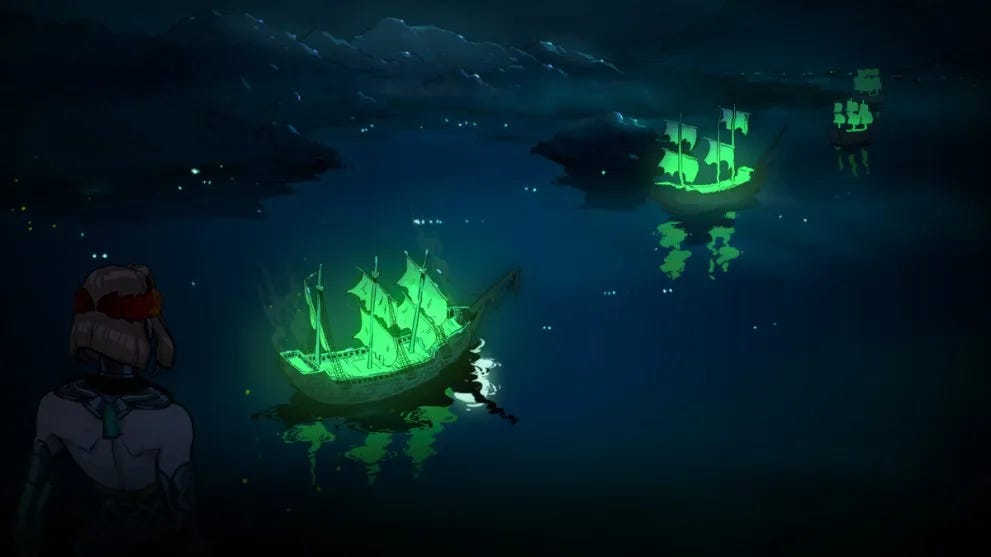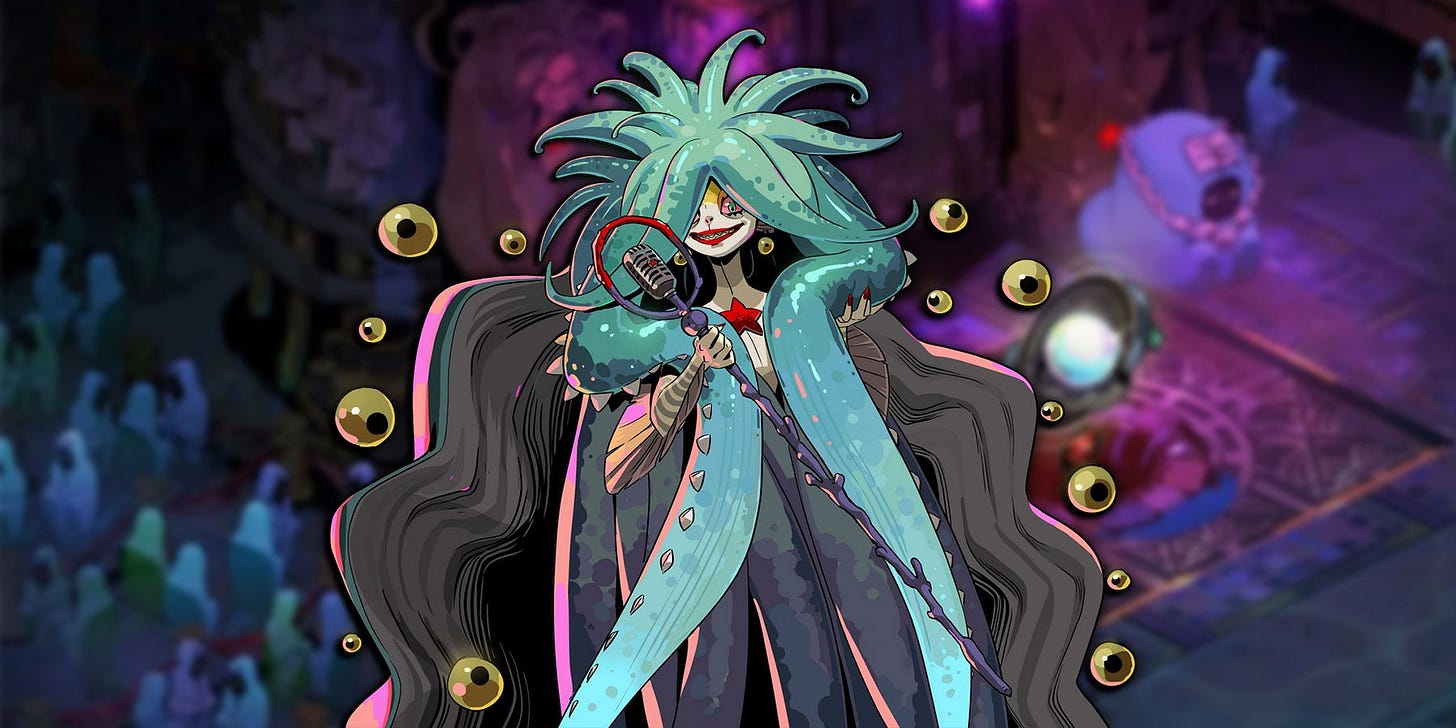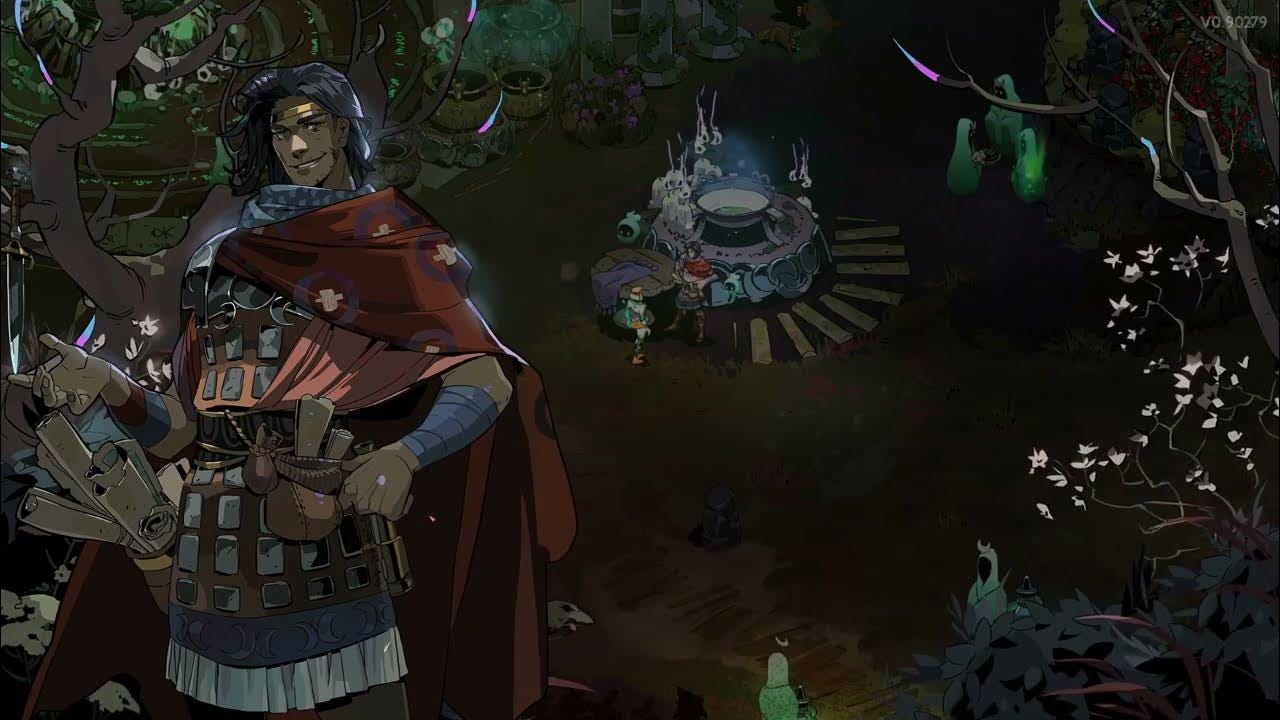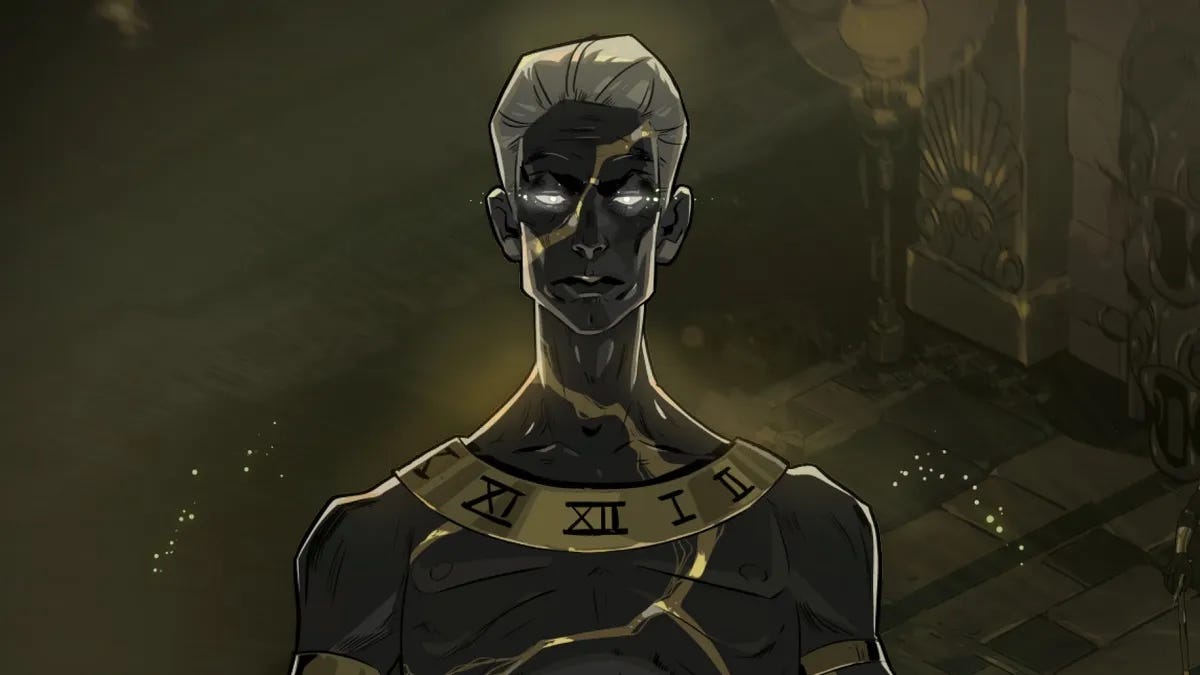I received the first Hades for free as a promotion on the Epic Games Store in late 2018. I played some of it, decided to wait until its full release, and returned in 2020 to find one of the best games ever made. Although I don’t play many brawlers and generally dislike Rogue-likes, I thought Supergiant had managed to seamlessly wed narrative and systems design into a brilliant, if slightly tedious, indie-action game.
I’ll never forget the day I reached the true ending. I was at the end of my tenth run, and I was sick of the game. I wanted to see what happened—I found myself deeply caring for Zagreus, rooting for him, desperate to find out what would happen between him and Persephone. But I couldn’t take another clear of Elysium again. It was driving me mad. I prepared to face Hades with Exagryph and told myself, “This is it. Win or lose. I’m done after this. I quit.”
…and that was the run Hades stepped aside, the final cutscene played, and the credits rolled.
That final scene, where Persephone decides to return to Hades, made the toil of so many escapes worth it. Hades found a way to create total harmony between the characters, their arcs, the story, and the gameplay, so that all could exist within the same world, justified for the same reasons, at the same time, and thus come to the same resolution. It was designed in totality: the narrative goal is to reach Persephone, which is to reach the end of the dungeon, which is the player’s goal, which is ever-resetting because Zagreus can never truly escape the Underworld, which facilitates endless gameplay, which focuses everything back in on your home base, because the stakes are so low that your friends (and family) can be the antagonists that you’re facing down. Everything works together to create the ultimate effect. Hades is a truly brilliant game.
So I had to buy Hades II
I knew I wasn’t going to be able to wait. Once everyone started talking about Hades II, I had to pick it up for myself. I heard that it was even better than the previous game. I heard that there was no reason to wait for it to exit Early Access.
Within a week, Supergiant has received infinitely more playtesting and feedback for their game than they ever could have through QA. This inevitably means that, in two years, Hades II will be a better game for Early Access. Unfortunately, the price is that those of us who chose not to wait have received a much worse experience. Hades II is obviously unfinished, lacking in content, and feels very rough around its edges. It is currently without an ending and loaded with placeholder art. I have no way of knowing what will or won’t change, and so I’m reluctant to speak on anything related to the gameplay. Who knows what it will be like by the time the full version comes out. I think it needs refinement, but given Supergiant’s record, I’m confident that it will be improved over the course of development.
But the story is unlikely to be altered at this stage. And while I quickly grew used to changes to the dodge and cast mechanics, I think Hades II represents a major step backward from its predecessor in narrative design. I beat Chronos for the first time yesterday, and I’m extremely disappointed. I’d like to examine a few of the reasons why.
Tone
Hades succeeds on its tone. Zagreus’ quest to find his mother is fundamentally a no-stakes journey that facilitates infinite gameplay. He is an immortal traipsing through the realm of the dead. He has infinite time on his hands. He is harming no one and causing no lasting damage. No matter how many times he succeeds or fails at making it to the surface, every respawn makes sense, and no suffering is being caused (except, perhaps, his own). By having no stakes at all for failure, the dialogue can be a little bit sillier, the characters can be more laid back, and the interactions between Zagreus and the antagonists can be much more intimate.
I love the tone of Hades. It’s cozy. It’s witty. It’s comfortable, and it’s extremely unique. It captures something about what it might really be like to be a bored god. It’s such an important part of the story. No other game has ever done anything like it.
In Hades II, you play as Melinoe, Zagreus’ younger sister. She was born shortly after the first game’s conclusion; and, following her birth, Chronos, Titan of Time, returned. He kidnapped her family, locked them away, usurped the throne of the Underworld, cast the dead back out onto the surface of the Earth, and is now waging a war against the Olympians.
Melinoe was secreted away by Hecate just as Chronos assumed power. As rightful Princess of the Underworld, she is now the gods’ only hope of defeating Time.
I hope you can detect the slight increase in stakes between story and sequel.
Melinoe is not just fighting for herself, or her family. She isn’t just fighting for the Underworld. She isn’t just fighting for the order of the gods, or the Olympians, or humanity. Essentially, all of order and existence rests on her shoulders. The stakes could not possibly be any higher.
We have gone from an edgy teenage god looking for his mom to a chosen one saving all of existence.
The tone has changed.
I hated this immediately and was never soothed. In abstract there is nothing wrong with going in a different direction for a sequel, but as a fan of the first game, it feels like a betrayal. The characters I loved from the first game have been removed, and are not only absent, but are apparently in torment, and every moment of my failure prolongs their suffering. As if death didn’t feel bad enough already!
Melinoe is a goddess, and it’s fine for her to be important. But you can get a story about being a chosen one in any standard fantasy game. Hades was unique in its family-driven mundanity. It is an Olympic long jump backward to turn it into something so gritty in such a generic way. Worse, it turns the story from cozy-and-relaxing to very-very-stressful, and that’s not what I wanted from this series at all.
But there are two more insidious issues with the ludicrous upping of stakes, beyond my personal distaste:
It ruins the structure of the dungeon loop;
and,
The writers no longer know how to manage the tone of the characters and the setting.
Consider Megaera in the first game. You fight her again, and again, and again, because Hades tells her to stop you every time you go to escape, and usually she fails. She’s just doing her job. She doesn’t have anything against you. Her boss wants you to stay home; you want to get past her. You fight.
Then, afterward, you grab a coffee together. No hard feelings. It’s a great relationship, justified by the story, the setting, and the gameplay.
Now consider Hecate. She plays the role of Meg in Hades II and is the first boss. She claims to be “testing” you, on every single run.
Every.
Single.
Run.
This makes some sense at first, or it would, if Melinoe wasn’t an immortal goddess for whom failure has no real price but time. But once you’ve made it to Chronos, one you’re stuck on his fight and can breeze through the rest of the game, doesn’t it seem rather counterintuitive for Hecate to be draining your valuable resources like Death Defiance when she herself is the one who wants you to defeat Chronos?
“I’m sorry, Headmistress. I would have killed Chronos and saved the universe. I got him down to 3% HP that last time. But you killed me in our first fight and used one of my Death Defiances. Guess we should’ve skipped the duel, huh?”
(this actually happened to me)
Why doesn’t Hecate pick me up and place me at the boss I’ve been struggling with, if killing Chronos is so important? Couldn’t she give me a bit more of a push? The same is true for every god. Why are they only offering boons, when ALL OF ETERNITY is at stake?
The first game never raised this question, because the answer was no one cares. Zagreus’ journey was his own. No one else had a stake in it. The gods threw you their boons because they were bored. But that cannot possibly be the reply when the gates to the Underworld itself are cast open.

The tonal issues seep down into the character and dialogue itself. I think that, for a game that takes itself so seriously, Hades II is bizarrely silly. Let’s look at the boss roster:
In Hades, you fight:
The Furies
The Lernaean Bone Hydra
Theseus and the Bull
Hades
These bosses all make sense within the setting and all take themselves relatively seriously. But in Hades II, you fight:
Hecate
The pop-rock band Scylla and the Sirens
Cerberus
Chronos himself
Do you notice something out of place?
Scylla and the Sirens are absolutely ridiculous. They’re charming, at least at first, but how do they fit alongside the others? They sing the song “I Am Gonna Claw Out Your Eyes (And Drown You)” and giggle as you do battle. They don’t take themselves seriously. They are, literally, a joke.
I get what they were going for. Someone at Supergiant thought: Sirens are from Greek mythology, in mythology they sing songs, popstars sing songs, so what if we have sirens who are a pop band be our bosses?
It’s a funny joke. But that’s all it is. It makes no sense in the context of the world, and it doesn’t fit within the tone. The first game might have been able to pull off something like this, given that it’s a much less serious game overall, but you’ll notice that it doesn’t try (except, perhaps, with the shades goofing around back at Hades). The bosses take themselves seriously. All of the main characters do. So why doesn’t Scylla? And why are they serving Chronos, anyway? Does this make any sense at all?
This really bothers me.
Besides being bizarrely punctuated, the dialogue in Hades II remains good. But it is tonally disjointed in a way that the first game never was. It was fine before when Poseidon was nothing but a dudebro caricature, because he didn’t need to be anything more than that: he is Poseidon, King of the Brocean. But when the story is so grimdark and serious, this characterization becomes ridiculous. It begins to feel like the gods helping Melinoe aren’t taking her quest seriously, which, in turn, makes it feel like I shouldn’t take it seriously. But when the stakes are so high, if I shouldn’t take the quest seriously, why am I playing at all?
I appreciate that Supergiant mixed up the formula. They didn’t want to do the same thing over again, and I’m glad that they attempted to grow the structure of Hades into something new. But I don’t think they’ve done a good job so far. The tone, one of the first game’s strongest elements, perhaps its strongest element of story, has been taken away, and instead we’ve received something much more generic, with a lot of strange inconsistencies.
Character & Plot
At the start of the story, we learn everything that we need to know about Chronos. Then, run after run after run, we never learn anything new. If, at the moment you sat down to play Hades II, you predicted that you would kill Chronos, and then have to kill him a bunch more times for some reason… you were correct.
I mean literally for some reason. Hecate isn’t sure. But she’s confident that if you keep doing it, maybe, at some point, she’ll figure it out.
I knew that, in order to learn more about Persephone, I had to keep reaching her, over and over again, until she finally caved in. I knew that Hades would try to stop me each time, and so I would have to fight him every time. But what is there to the goal of reaching Chronos? What’s going to change? Why should I care? What do I gain with each successive victory?
Hades II has no sense of narrative progress. At no point in my 16 hours of playing Hades II did I discover anything about the characters or the story. I understood everything at the start, and I had the same understanding at the end. No twist ever came to disrupt what I thought I knew. No revelation ever recontextualized what had come before. No one was ever shown to have been truly behind the scenes. I killed Chronos, and I was told to do it again, for some reason. That was it.
Obviously the game isn’t complete. But really. That’s it?
There’s a ton of dialogue to find with the various characters. There are interactions to be had. But Hades II is plagued with this problem. Time and time again you’ll hear a few lines from a god when receiving his or her boon, and each time there will be some utterly vapid commentary: “Oh, you’re battling Chronos’ minions, eh? I am, too!” Always it will be phrased in some new way, but it’s inevitably the same.
This dialogue tells us nothing. It’s just filler. It says nothing about the story, the relationships, or the world. You could cut it out and lose nothing; and once it stops playing, you’ll actually be relieved.
I had the same problem with the first game. It hasn’t been rectified this time around.
So much of the game suffers from this. I go to camp and see that Nemesis has something new to say:
“You got pretty far last time. Just watch out. I’m better than you.”
“I’m sure you are, Nemesis. But I’m going to kill Chronos first.”
"Huh. Yeah right.”
“Death to Chronos.”
Every conversation is the same. They’re all to this formula. Occasionally there might be some flicker of character buried within the dialogue, but for the most part the interactions are totally vapid. They feel like filler. I found that I quite liked Odysseus, but of all the times I talked to him, he only really said anything when we took a bath together. A long-running gag in the first game is that Charon talks only in groans; here, Melinoe can apparently understand him, and talks back at him like he’s actually saying something worth listening to. But he’s not. It’s just another conversation without any substance.
It’s one thing to experience this in camp. But when it comes to major story beats, it’s unacceptable. You might expect that each encounter with Chronos he reveals more and more of his plans; in fact, he says nothing but some new vapid threat.
And maybe this is just Early Access. Maybe it’s all Early Access. But if Supergiant felt like their game was good enough to sell, then I feel like it should be good enough to play. And this is not good enough.
Hades makes a small reappearance. I’m sure we’ll see more of him down the line. Zagreus and Persephone do not. I find this extremely disappointing and borderline unacceptable. An absence of recurring characters beyond gods and their boons is another major source of disappointment. These things are probably subject to change, but who knows how many more years of EA we can expect before we actually see Zag or Persephone again.
Nemesis is a catastrophe of a character. She has none of Meg’s charm. Despite being an ally, she appears sometimes to steal your rewards, rob your coinpurse, and make your life worse in every way. It’s ironic, and perhaps a lesson in game design, that this has made me loathe her far more than the literal homicidal boss who fights you time and time again in the first game. I cannot stand her, and I wish that I could kill her.
Maybe it’s fitting that Nemesis is my nemesis. But I don’t think it’s what they were going for.
I do not know how I feel about Melinoe herself. I love her voice actress, and in her few moments of relaxation, such as her bath with Odysseus, I found her to be very charming. But she’s mostly edgy, serious, and determined. How can she be anything else? So much rides on her shoulders, she can’t afford to be witty or casual about anything. Her life demands seriousness. It would be bizarre if she were written any other way. The most that I can say is that she lacks Zagreus’ effortless charisma, and it’s hard not to miss his boyish charm. He felt much more human to me, and far more relatable.
But I’m certain that I dislike Chronos as a villain. He comes across like a Boomer who wandered out of the old folks' home in the sky; his spindly, geriatric art is laughable, and his condescending voice would befit a cancer patient, rather than the Lord of Time himself. He is far more grating than intimidating.
Hades was a fantastic antagonist. You understood what he wanted, why he wanted it, and he was always there to talk to after a battle. But Chronos is enigmatic, confusing, and boring. He isn’t fun to hate, and he isn’t interesting to learn about (if there’s anything to learn at all). He is, by far, the game’s weakest link.
Disappointment Is Subjective
Judging by Hades II’s reception so far, I would be willing to guess that many of my complaints are not shared by the playerbase at large. Most players probably don’t spend hours thinking about how this death to Cerberus means that 500 Spartan children will now have to be slaughtered by ghosts in the fields of Thessaly, or how that bath with Odysseus was paid for by Zagreus’ agonized screams.
And in a lot of games, I can put that kind of stuff out of my head, too. But Supergiant has largely built its reputation on ludonarrative consonance. Their games excel at wedding gameplay to narrative. This is why I find it extremely disappointing that they have gone in what I feel to be an ill-conceived direction for Hades II. It isn’t a bad game by any stretch. There is good stuff tucked away within it, and it will get better throughout Early Access. Maybe all of my issues will be resolved—although I doubt it. But it’s undoubtedly a much messier game than its predecessor, which excelled precisely because its narrative design was so tightly focused around the central, personal journey of Zagreus, and not some ridiculously huge high-stakes fantasy world-saving quest.
I’ve uninstalled it already. I don’t want to touch this game again until its full release, although I fear that might be three or four years from now. I’ll reexamine this review then and adjust my thoughts accordingly.
From where I sit now, I’m certain that Hades II will ultimately be a decent, maybe even great, game. But I doubt its story will ever come anywhere near the splendor of the last game.








Now that the game has released, I'd be interested in your updated thoughts. I only played an hour and I felt some of what you're talking about. The game drops me in and I have no idea what is going on or why. I gather that Chronos is the bad guy but I haven't heard about the ghost ships yet, so I haven't realized the stakes are millions of people dying while I screw around. I think the voice acting is a little worse...not as charming as Zagreus. All of what you say about the meta-narrative strikes me as true. Why am I fighting my mom again what? How about she does it in an arena like the guy that can't be killed does; it makes no sense for her to be 'in the dungeon'. Even the underworld seems washed out, not nearly as interesting as what was going on in the original Hades. Anyhoo, enjoyed reading this, guess I wasn't the only one thinking the sequel is not as good!